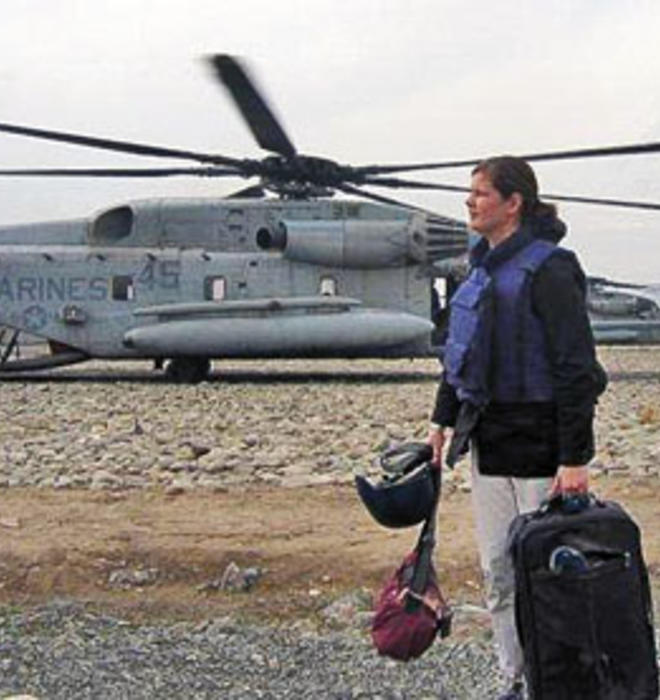
Choosing danger
Why do some people willingly work in conflict zones, when they have so many other options?
“What have I gotten myself into?”
That’s what Kira Gnesdiloff ’98 found herself thinking in 2004, after she landed in Kabul to start a yearlong assignment for a French nongovernmental organization. This was after Gnesdiloff, a politics major, had spent two years with the Peace Corps in Ghana. It was after she’d lived for a time in Monterrey, Mexico, when her Foreign Service-officer husband, Rob McInturff ’98, was stationed there. She had traveled frequently while growing up, she says, and loved learning about new places and cultures. But Afghanistan “looked like no place I’d ever seen before,” Gnesdiloff thought. There were rusted, bombed-out tanks and husks of old planes lining the runway at the dilapidated shell of an airport. Crumbling, battle-scarred buildings remained all over town, vestiges of the vicious civil war Afghan warlords waged against one another in the 1990s. Military vehicles from numerous NATO countries prowled the streets, as did pickup trucks with gun-toting Afghan militiamen of unknown allegiance. And outside the capital, the Taliban were regrouping, soon to render large swaths of the country’s east and south a no-go zone for foreigners.
This was, quite clearly, a war zone, making her question — “What have I gotten myself into?” — understandable. In eras gone by, it was hardly unusual for Princeton students to go into the military, during or after their studies. But now, with the draft long since dissolved, fewer graduates have direct experiences of war (though a small number volunteer each year). And Gnesdiloff didn’t have to go to Afghanistan, which made her choice to sign up with ACTED, which focuses on community development and emergency humanitarian response in developing countries, seem all the more unusual. Her husband’s colleagues wondered if something was wrong with their marriage (quite the contrary, she says). Her grandmother, who had grown up in Berlin after World War II, was even more perplexed. “I don’t understand why anyone would voluntarily choose to go to a place where there is a war,” Gnesdiloff recounts her grandmother saying.
Not many of her classmates had chosen similar paths, Gnesdiloff says, but she is hardly the only Princetonian who willingly went to work in a conflict zone when it would have been just as easy to do something else. It seems fair to ask, as Gnesdiloff’s grandmother did, what would motivate someone to go toward a situation so many are trying to escape. It’s a question I’ve often asked myself, during and after numerous reporting trips to conflict and post-conflict areas. In early 2001, I moved to Hong Kong to work for Time magazine in Asia and soon found myself in the Indonesian province of Aceh, where separatist rebels and the military were in the midst of a nasty fight, and then in East Timor, which was trying to compose itself after a vicious round of violence during its push for self-determination. Later, after Sept. 11, came repeated trips to Afghanistan, Mindanao in the southern Philippines, Pakistan, Iraq, Burma, Sri Lanka, and Gaza during the 2006 war there. I hadn’t planned on going to such places, but when the opportunity arose, going seemed like the natural thing to do. It was fascinating work. There was much to learn and to enjoy. There was much to endure as well, and over the years, there certainly were times when I asked myself what I was doing there.
I decided to answer some of my own questions by asking them of others. The people interviewed for this article — alumni who have worked in conflict areas as journalists, development and aid workers, engineers, and diplomats — told of different perspectives, different continents, and different experiences. One went to his first war zone decades into a Foreign Service career; one went just months after graduation. Some fulfilled a long-harbored ambition, while others — like me — were buffeted by the tides of current events. Some found it hard to be away; others found it hard to come home. Yet their stories are united by the shared sense that going to a war zone, as unnatural and daunting as it may have been, was worthwhile. For a time, at least, it made sense. It was a privilege. And it had a profound impact on them.
Going: Gnesdiloff doesn’t remember exactly how she answered her grandmother. She thinks she said that going to Afghanistan was “an amazing opportunity to be part of something,” a chance to “effect change at a critical time.” In truth, she was as surprised as anyone. Knowing she wanted to work in development, she’d applied for posts at several nongovernmental organizations and at USAID, but “I certainly had no specific intentions of going into a war zone,” she says. When a job in Afghanistan first came up, she thought “it was crazy and random, and there was no way I was going to do that.” Yet she didn’t say no, and the notion lingered in her mind. Slowly, she realized she actually was considering it.
Why? There was her German mother, who’d long ago instilled in her, Gnesdiloff says, “the idea that the world is bigger than the U.S.” There was her interest in international development work and her willingness to consider working and living in another country. There was her sense of adventure and the kind of curiosity that has compelled people to journey far from home since the dawn of history. Over time, Gnesdiloff came to believe that the job was worth doing; later, McInturff requested and received an assignment in Afghanistan, too.
Similar traits predisposed other alumni to consider this kind of work — to want to go out and look for something, or serve a specific role, in less-than-stable environments. Gregoire Landel ’98, for instance, is the son of French parents and has lived over the years in France, the Ivory Coast, Uganda, and Libya, in addition to the United States. His family, he says, has been “full of explorers, soldiers, and business people and traders” who have been traveling since the 19th century; with his engineering degree in hand, Landel went to work designing water systems in developing countries, a job that has taken him from his Paris home to Liberia, Algeria, and Pakistan. Duncan Fitz ’08 was raised in Pennsylvania and then Tennessee, in a household in which he imbibed a belief in serving one’s country and aiding the less fortunate. After studying in the Woodrow Wilson School, Fitz took a job with a development organization called the Peace Dividend Trust and left for Afghanistan weeks after getting his diploma.
Timing plays a role. Fitz says that Afghanistan was “the place” to do the kind of work he wanted to do when he graduated. In years past, the opportunities were elsewhere. In the early 1990s, for example, Daniel Serwer *77 was nearing the end of a 21-year run in the Foreign Service during which he’d served as deputy chief of mission at the U.S. Embassy in Rome, among other posts, when he was asked to help monitor the shaky peace accord that had been worked out for Bosnia. It was quite unlike his other assignments, and though there was still fighting in the area, he agreed.
In the past decade, Sept. 11 shaped careers in the same manner. James Glanz *91, who had earned a Ph.D. in astrophysics, was a science writer at The New York Times when he was assigned to write about the structure of the World Trade Center towers and why they fell. Two years later, after talking to colleagues who had returned from the site of the biggest story going at the time — Iraq — and deciding that he wanted to be a part of it, he convinced his editors to send him to Baghdad to cover the reconstruction of the country. What he thought would be an engineering and development story instead turned out to be “a story of failure after failure,” he says, interwoven with the politics and the violence of the place. But he returned repeatedly over the next five years, at times serving as the Times’ bureau chief. In a similar fashion, Brian Bennett ’00 moved to Hong Kong through the auspices of Princeton-in-Asia to join the home office of Time’s Asia edition. After Sept. 11, he grew increasingly curious about militant radical Islam. In 2002, he covered the immediate aftermath of a terrorist attack in Bali that killed more than 200 people and later went on reporting trips to Pakistan and Afghanistan. On the eve of the Iraq war, he went to a U.S. base in Kuwait to report on one of the American staging grounds, talked his way onto a C-130 headed to Nassariya — informing the editors only after he’d arrived — and went from there to Baghdad, where he spent most of the next four years.
Neither Glanz nor Bennett nor I set out to cover wars. But wars happened. And going to see them firsthand felt like the only way to understand what war actually was, and what was at work in these particular conflicts. All the considerations — professional and personal, conscious and unconscious, a sense of what is worthwhile and what is desirable — resulted in the determination that nothing could match actually being on the ground.
Arriving: Serwer, on his first trip to Sarajevo, had to borrow body armor from someone at Doctors Without Borders. He, like most of those he traveled with, never had been shot at. But as his plane landed, it was hit with small-arms fire. After disembarking, Serwer stared at the bullet holes until a Swedish peacekeeper yelled at him to get inside because shots were still being fired.
At some point in such an experience, it becomes clear that these are very different circumstances. The indicator could be gunfire in the distance, or the sight of soldiers in combat gear. Or it could be an explosion like the one that shattered the windows of Gnesdiloff’s office in Kabul soon after she’d started work. However the message is delivered, the new arrival learns to adjust, adapt, and find a way to exist in that space despite direct and indirect threats to safety, or the generalized sense of violence that can permeate the air. Many recent conflicts haven’t had front lines, per se. The violence can float, burrow, disguise itself, until it is unleashed. There are places that are ostensibly more dangerous than others, of course — southern Afghanistan now, western Iraq a few years ago, and eastern Congo for far too long — but few that are categorically “safe.”
Getting accustomed to dangerous places, Serwer contends, is not a matter of courage or bravery. “I regard myself as a physical coward, so this may seem anomalous, but gunfire, mortar fire — it didn’t bother me much,” he says. After that first trip, he returned to Sarajevo many times. And after leaving the Foreign Service, he joined the U.S. Institute for Peace, for whom he has worked in the Balkans and more recently in Iraq and Afghanistan. His role differs from that of a journalist, he notes, because “I didn’t have to run toward gunfire.” Still, though, “I’ve always told my family, basically, I don’t do things that require a great deal of courage. If I think it requires a lot of courage to go out on such and such a meeting, I won’t do the meeting. There’s no meeting — I was like this even when I worked for the State Department — that’s worth my life.”
That’s a formula he uses to gauge whether a risk is acceptable or not. It gives him a framework in which to operate — something everyone interviewed for this story said is one’s own responsibility. “You’d better be concerned with your own safety, because there’s nobody more responsible for it than you are,” Serwer insists. As Glanz notes, “Once you get over there, you think you’re going to be surrounded with fear, and dealing every day with worries about your own physical safety and angst and paranoia about what the next day is going to bring. But it turns out that if you’re suited for that environment, you spend almost all your time on logistics: How do I get from point A to point B?”
That was certainly part of Gnesdiloff’s daily considerations. While with ACTED, she tried to help Afghan farmers figure out how to enhance their economic prospects, which meant constant contact with Afghan colleagues and constituents, and frequent trips to villages and provinces outside Kabul. And it meant a lot of time in cars, inside and outside the capital, trips Gnesdiloff would begin by visualizing what she would do if a roadside bomb exploded on this or that side of the route (often, she had been told, the bombs were hidden in soda cans or other inanimate everyday objects) or if gunmen approached from one direction or another.
She was aware, of course, of attacks that occurred in Kabul and on some of the roads she traveled. But once in a war zone, one’s sense of distance can change. Being a half- or quarter-mile away (or a week ago, or a month ago) from an attack starts to seem like a safe remove. And if you’ve been in a place before, if you know where to stay and eat, if you trust the people you work with, if you have a sense of what is and is not likely to happen at a given time and from whom to get a sense of the mood at a given moment, your visit is therefore tolerable. It even can be pleasant. You make friends. You have great conversations with people who are engaged in similar pursuits. People learn things about others and themselves. Some fall in love. And there can be a clarity of purpose that’s hard to find elsewhere, “an atmosphere, something in the ether,” says Glanz. “I don’t know if I want to call it excitement, but it’s an elevated plane of being that you’re on all the time.”
And then there are moments when the danger gets close, shattering and bloodying any complacency one might have. These can be moments of violence — like the bombing near Gnesdiloff’s compound or the shooting at Serwer’s plane — or longer episodes that completely reshape the environment. In Iraq from the fall of 2004 onward, Glanz says, he found himself responding to events almost clinically, as if he were looking at a “control panel in my vision,” like a pilot reading measurements as he steered a plane. And “if you do the right thing at the right time, it’s going to be fine. If you let your emotions get involved or something else, like somebody else’s bad judgment, then maybe you won’t be.”
He recounts one instance during the height of Iraq’s sectarian bloodletting, when Shia militiamen were beating an Iraqi New York Times employee, saying they wanted to take him away, which, at that point, almost certainly meant they would torture and kill him. The commotion was near the Times’ house, a well-protected building that sat behind tall blast walls and had constant security. Glanz says he approached the gunmen in a state of focused calm. As it happened, the situation was de-escalating — the employee would be released — but that moment stands out for him as one in which the control panel was engaged, as it were — when walking into what seemed a clear and present danger was the instinctive move.
Some situations upset even the most considered attempts to contain one’s own reaction. For Glanz, going to a hospital in Sadr City and seeing the body of a child who’d been shot in the head was one such occurrence, a moment of horror that sickened him. For me, it was the terrified visage of an Iraqi man who’d been shot in the face and was being kept alive by Marines. Why one moment, given all the others? It’s some combination of intangible factors and timing, or some violation of one’s sense, extant even in a war zone, that some things are just not right. These are the things that stay with you for the duration.
Some of these memories and tragedies are intensely personal. Bennett’s colleague and friend Michael Weisskopf lost a hand when a grenade exploded as he tried to throw it out of the truck into which an insurgent had tossed it. An Iraqi who had managed Time’s Baghdad bureau was assassinated in the street, and two staff members were nearly killed by a roadside bomb. Glanz lost colleagues. A friend and colleague of Gnesdiloff’s was killed in Helmand Province when someone threw gasoline in her face and set her on fire. Three of the four Marines I rode with one night in Ramadi were killed weeks later when a suicide car bomber rammed their Humvee.
Dealing with that loss and pain — the “that could have been me” or “I should have done something differently” — without being exceedingly self-destructive can be a challenge, as can figuring out when it’s time to leave, or time to stay away for a while. “Everyone does have a threshold for coming back with real damage,” Glanz says. “There’s a limit inside every person. When you go past that limit, some people break down. Some people change completely. Some people get PTSD [post-traumatic stress disorder]. I saw that happen to a lot of people. People stayed too long. They can’t leave.”
Bennett says that his reasons for being in Iraq changed over time, as the costs of conflict became clearer and nearer. “I think those types of events made wanting to go to these places less about my motivation, about my desire to see things and be in the center of history.” Instead, he increasingly saw journalism as a service: “I think it’s important work. I think it’s a job in which I know I can make a contribution.”
Serwer sees his efforts at the Institute for Peace in a similar vein, as he worked at bringing together Kosovar rebels and Serbs to forge an accord after the 1999 war in Kosovo and at a meeting with Sunni tribal sheikhs in Iraq in an attempt to convince them to rejoin the political process. “I don’t regard what I do and what my colleagues do as courageous,” he says. “I regard it as a privilege. It’s a privilege because we are put in a situation where we’re helping to get people talking to each other and helping to build peace. There’s nothing like war and peace for a diplomat.” It’s not for the adrenaline rush that he does it, Serwer insists — “it’s for the privilege of helping prevent a lot of people from getting killed.”
Still, there’s no question that aid workers and journalists have been targeted — and in some cases, killed while cameras rolled — with far greater frequency than in days gone by. And when it feels like the violence limits one’s work, that sense of fulfillment can wane. That’s what happened to Katherine Zoepf ’00 when she worked with The New York Times bureau in Iraq. She’d started at the Times office in New York City the week before Sept. 11, later moving to Syria for two and a half years and Lebanon for another six months. She reported all over the Middle East — having long conversations with people, being taken into their homes and lives, getting to know them as intimately as possible.
Zoepf continues to travel to the region, but says that “in conflict zones, it’s all about speed.” In Iraq, she recalls, there would be, for example, a bombing outside a police training center, “which happened a couple of times when I was there last, in the fall of 2008,” she says. And “if you could do all your reporting in 15 minutes, that would be great. If you could do all your reporting in eight minutes, that would be even better. [The Times security consultants] just wanted you out of the car, see the scene, scratch down a few notes, talk to two people, and get back in the car, and then they’re out of there going a different route home. I just felt like I wasn’t very good at doing work in those circumstances. I found it upsetting. I found seeing those things upsetting enough.”
Coming home, going back:Returning from time spent in war zones, especially longer stints, is difficult. Your brain and body have internalized tension, fear, and anxiety, because in dangerous situations, heightened awareness helps people survive. That can become one’s “normal” way of being, making adjusting to life “back here” as much of a challenge as adjusting to life “over there.” When I got back from my second stint in Iraq, a physical therapist told me that my neck was as compressed as that of someone who had been in a bad car accident — the result, she posited, of weeks spent in a defensive posture, shoulders hunched, without realizing it was happening. I don’t doubt that. While visiting my family in New York, I didn’t want to walk under scaffolds because they reminded me of being in Humvees. When I heard fireworks one night, I had to go see them myself to be sure that they weren’t explosions. When I was asked to return to Iraq, I said no (though I later returned to Afghanistan several times and traveled to other anguished landscapes such as Sri Lanka, Nepal, and Israel and the Palestinian Territories during the 2006 wars in Gaza and Lebanon).
Bennett got married after his return to the United States, which changed his perception about an appropriate job to an extent, though he later returned to Iraq and more recently spent several months in Afghanistan working for the National Democratic Institute. Fitz, having done one eight-month stint in Afghanistan, is now back in Kabul working for the Cetena Group, a U.S.-funded but Afghan-owned development outfit for whom he manages literacy programs for the national police. Glanz, for his part, now works for the Times’ investigative desk and is based in New York. Even there, it can be hard to replicate the ambient energy and the feeling of being in the red-hot center of the news world he knew in Baghdad. “I always tried to feel like I was bouncing back after each rotation,” he says. “I’d come out having seen stuff I didn’t want to see, and sometimes I’d be angry on the streets [in New York] because people were enjoying themselves here a few days after I saw a dead kid. And I always made a point to come to accommodation with myself, so I could say, ‘OK, you got over it again, you’re ready to go. You changed. You saw some things. You pushed yourself to your physical limits and your mental limits, but you’re still a good old kid from Iowa who likes to play baseball and enjoys hanging out in New York.’ And I think I was able to do that.”
“These are, on the one hand, searing experiences, there’s no question about that,” Serwer says. “But they are, on the other hand, some of the most satisfying experiences.” I would agree. Sitting in Brooklyn, writing this, I admit to feeling a pull, a kind of longing, a desire to be back in some of these places, on the ground getting the dirt on my boots. I’ve never once described myself as a war correspondent. It felt limiting. I am, however, fascinated by how people endure conflicts, how they recover from conflicts, how they rebuild and reconstruct their lives — in short, how they live with it. And I’ve rarely had the feeling of immediacy and presence that I experienced in war zones — that sense that nothing else matters except what you do next, in that instant.
As for Gnesdiloff, she spent a year with ACTED in Afghanistan, then another year with USAID. It was, she says, “life-changing.” After returning to the Washington, D.C., area, she and McInturff had a daughter and planned to become more settled. When she thought of Afghanistan, she thought first about the people she had met and worked with, not the tension or the violence. But one day, while driving, she saw a Coke can in the road and instinctively swerved to avoid it, startling herself. And the plans to remain stationary, she says, “didn’t work out very well.” She and her husband realized that “we’re both now getting an itch.” Not long ago a new employer, the Training Resources Group — which, among other things, trains people and organizations to operate in conflict and post-conflict environments — offered her a job that could very well take her back to Afghanistan, as well as to Iraq and possibly Sudan.
She said yes.
Before taking his current position as managing editor for publications at Doctors Without Borders-USA, Phil Zabriskie ’94 lived and worked in Asia and the Middle East as a staff writer for and as a freelancer for , , , and other publications.


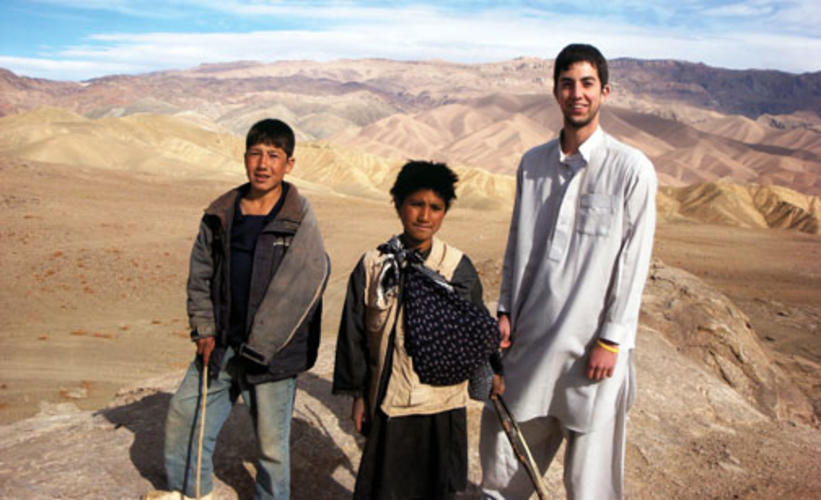
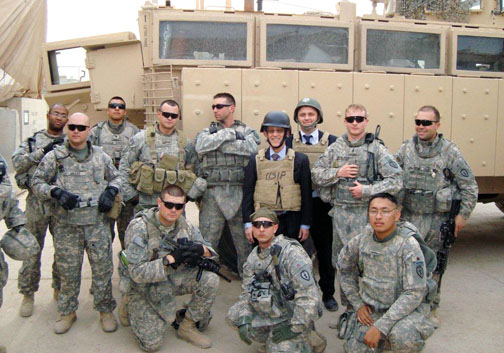
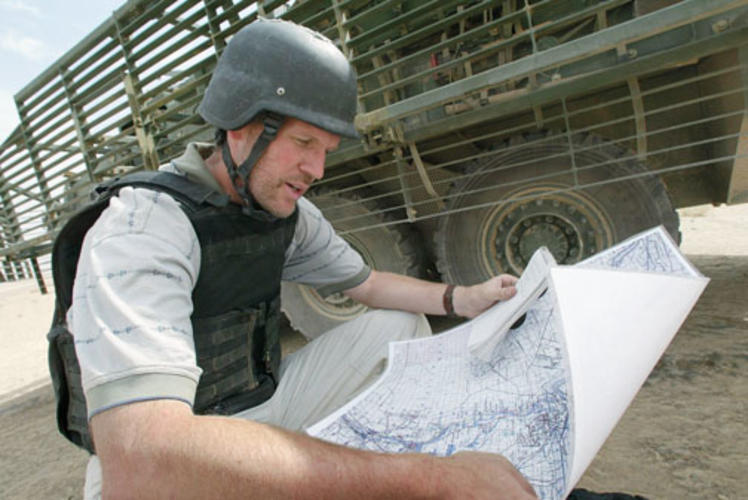
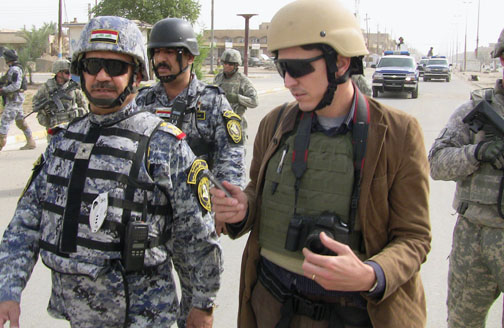

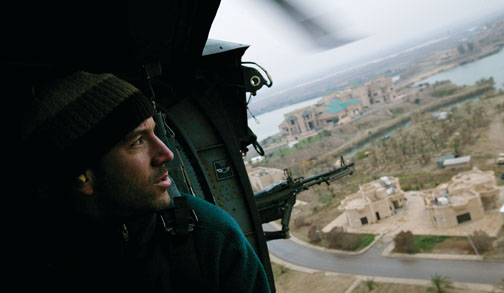




No responses yet